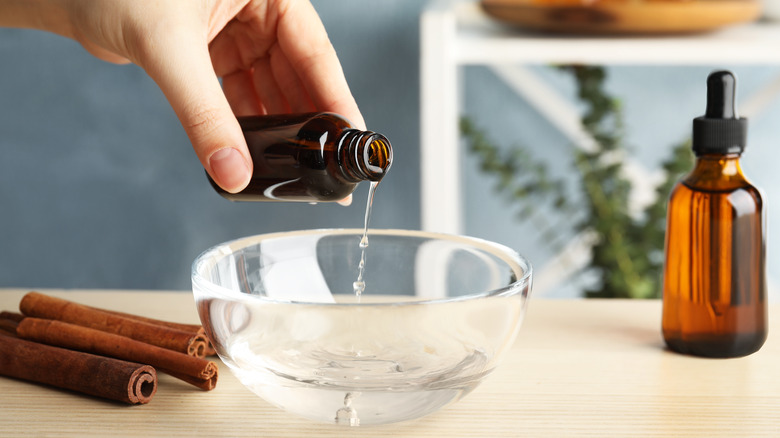What Cinnamon Oil Really Does For Your Body
Cinnamon oil is extracted from the bark and leaves of several species of cinnamon plants, and while it is known for its aroma, it boasts several healthy uses that have been applied for hundreds of years (via Science Direct). One potential benefit of cinnamon oil is its ability to help fight infections. It contains the antimicrobial compound cinnamaldehyde, which helps reduce inflammation. Studies indicate that cinnamon oil is not only antibacterial, it has an antimicrobial effect on the drug-resistant bacteria Pseudomonas aeruginosa, which can be life-threatening (via Healthline). Its immune-boosting compounds also help maintain good oral hygiene, which is why you might see it in some toothpastes and chewing gums. The oil helps fight against Streptococcus mutans and Candida ssp, two bacteria that can cause infections and cavities.
In addition, cinnamon oil is associated with improved digestion and circulation, pain relief, and stress reduction (via Verywell Health). A 2017 study on mice showed that cinnamon oil helped reduce depression and anxiety disorders (via National Institutes of Health).
How to use cinnamon oil safely
Cinnamon oil has many uses, but the pure-strength oil is strong. It can irritate the skin or lungs if it is applied directly to the skin or inhaled. Don't ingest pure cinnamon oil, because it can burn the insides of your mouth and throat.
The oil works best when mixed with another oil that is gentle on the skin, such as lavender, sweet orange, geranium, patchouli, or almond oil (via Well + Good). When mixing a blend for skin application, start with a low dose to see how your skin will react. One drop of cinnamon oil with 30 to 40 milliliters of another oil is a good place to start. To take advantage of cinnamon oil's aromatic benefits, add a couple of drops to dried flowers or in your diffuser with water for a warm, inviting scent in your home.
If you are diabetic or have liver disease, check with your doctor before using cinnamon oil, because it may interfere with medications you may be taking.


